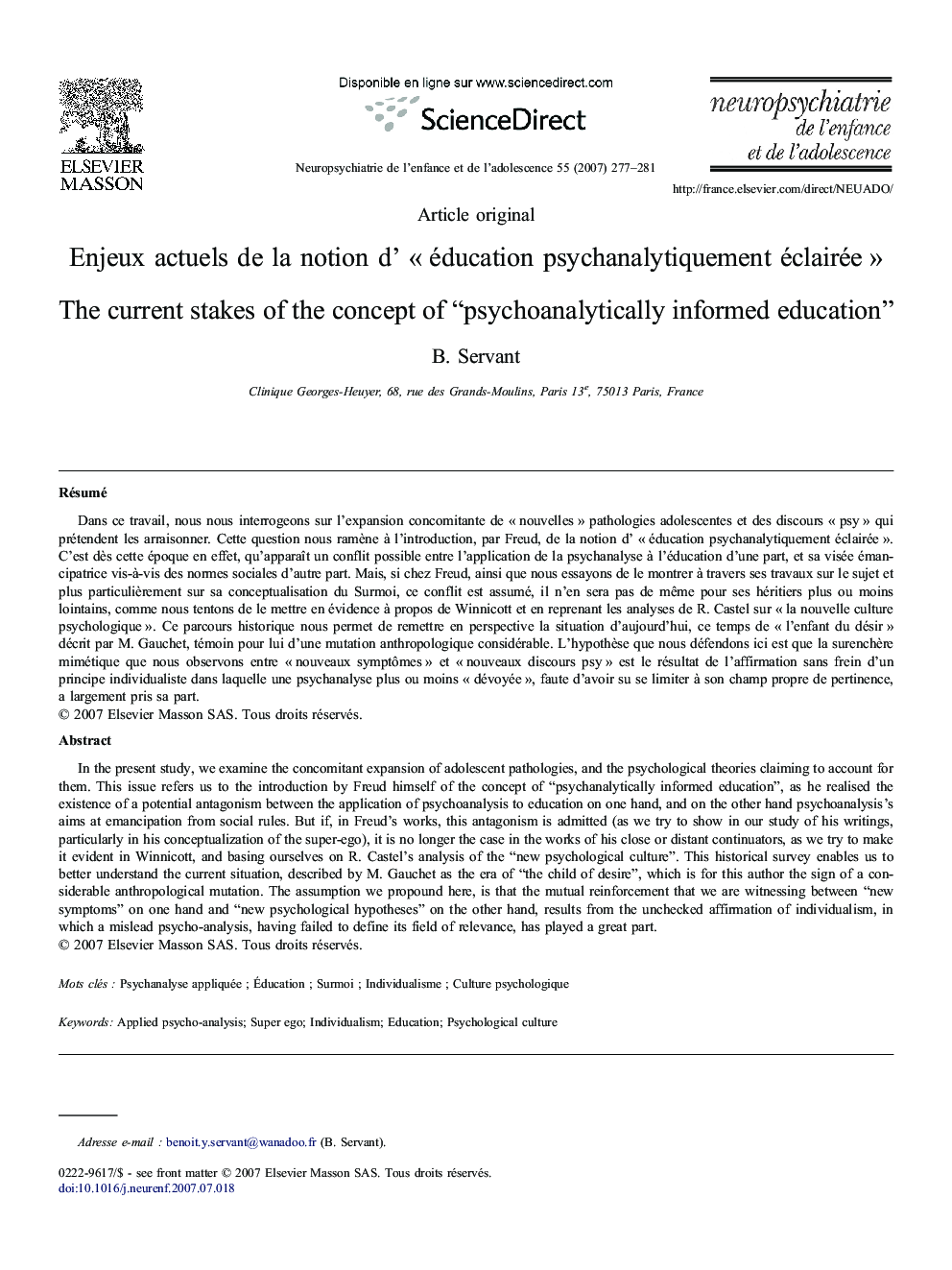| کد مقاله | کد نشریه | سال انتشار | مقاله انگلیسی | نسخه تمام متن |
|---|---|---|---|---|
| 944566 | 1475526 | 2007 | 5 صفحه PDF | دانلود رایگان |

RésuméDans ce travail, nous nous interrogeons sur l'expansion concomitante de « nouvelles » pathologies adolescentes et des discours « psy » qui prétendent les arraisonner. Cette question nous ramène à l'introduction, par Freud, de la notion d' « éducation psychanalytiquement éclairée ». C'est dès cette époque en effet, qu'apparaît un conflit possible entre l'application de la psychanalyse à l'éducation d'une part, et sa visée émancipatrice vis-à-vis des normes sociales d'autre part. Mais, si chez Freud, ainsi que nous essayons de le montrer à travers ses travaux sur le sujet et plus particulièrement sur sa conceptualisation du Surmoi, ce conflit est assumé, il n'en sera pas de même pour ses héritiers plus ou moins lointains, comme nous tentons de le mettre en évidence à propos de Winnicott et en reprenant les analyses de R. Castel sur « la nouvelle culture psychologique ». Ce parcours historique nous permet de remettre en perspective la situation d'aujourd'hui, ce temps de « l'enfant du désir » décrit par M. Gauchet, témoin pour lui d'une mutation anthropologique considérable. L'hypothèse que nous défendons ici est que la surenchère mimétique que nous observons entre « nouveaux symptômes » et « nouveaux discours psy » est le résultat de l'affirmation sans frein d'un principe individualiste dans laquelle une psychanalyse plus ou moins « dévoyée », faute d'avoir su se limiter à son champ propre de pertinence, a largement pris sa part.
In the present study, we examine the concomitant expansion of adolescent pathologies, and the psychological theories claiming to account for them. This issue refers us to the introduction by Freud himself of the concept of “psychanalytically informed education”, as he realised the existence of a potential antagonism between the application of psychoanalysis to education on one hand, and on the other hand psychoanalysis's aims at emancipation from social rules. But if, in Freud's works, this antagonism is admitted (as we try to show in our study of his writings, particularly in his conceptualization of the super-ego), it is no longer the case in the works of his close or distant continuators, as we try to make it evident in Winnicott, and basing ourselves on R. Castel's analysis of the “new psychological culture”. This historical survey enables us to better understand the current situation, described by M. Gauchet as the era of “the child of desire”, which is for this author the sign of a considerable anthropological mutation. The assumption we propound here, is that the mutual reinforcement that we are witnessing between “new symptoms” on one hand and “new psychological hypotheses” on the other hand, results from the unchecked affirmation of individualism, in which a mislead psycho-analysis, having failed to define its field of relevance, has played a great part.
Journal: Neuropsychiatrie de l'Enfance et de l'Adolescence - Volume 55, Issues 5–6, September–October 2007, Pages 277–281